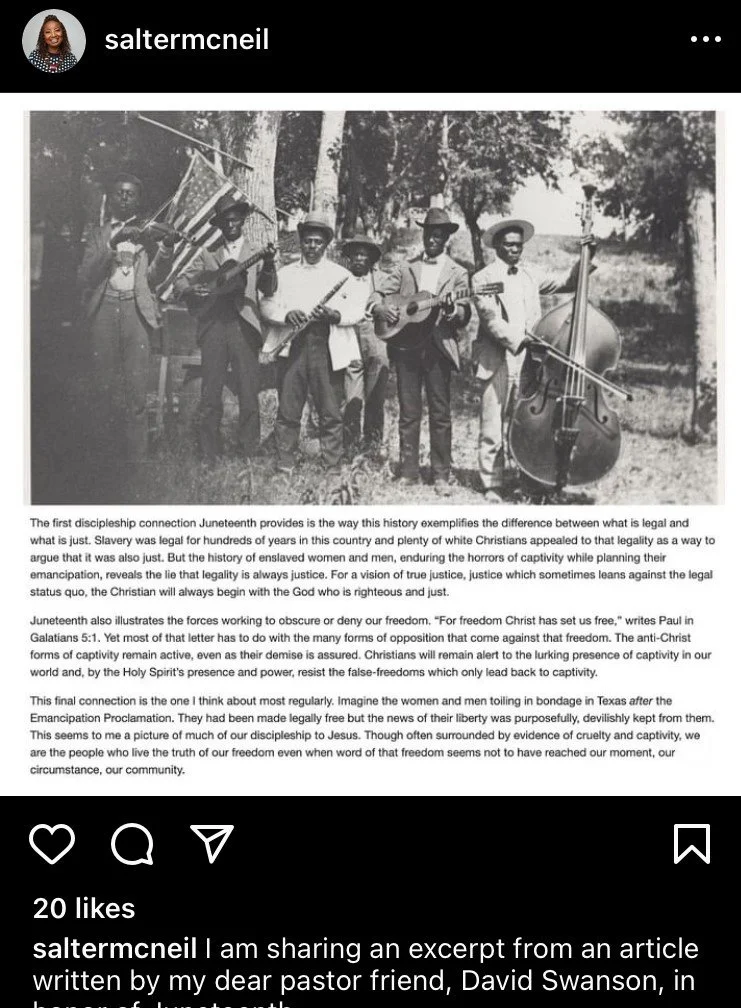Good Morning, Church!
This Sunday Pastor Tim will be continuing our new sermon series, Salt and Light. For this week’s blog I wanted to share with you something I read from the Asian American Christian Collaborative that I saved because the message by writer, Naomi K. Lu is so powerful. I really believe that by embracing the people God created us to be, we in turn become light to those around us and light to ourselves. I hope this message blesses you the same way it has blessed me:
“The Names We Hold
May is Asian American, Native Hawaiian, and Pacific Islander Heritage Month. It is a large grouping, but I suppose it’s because we only have so many months in the year. We balk at how we are lumped as a mass, drawn together by our foreignness. Still, we must unite as a collective to protect our fragile place in a binary America, while also struggling to celebrate and showcase our unique and beautiful differences. Heritage is history. Heritage is a celebration of all that we were, all that we are, and all that we will be. It transcends time, passing down our roots through centuries, our glories and our traumas tied into our bloodlines. We hold the depth of all that we have come from, while carving new ways of being; we heal and we lament and we dream of a future that is brighter and gentler for the next generation than it was for us. Heritage is a declaration of our dignity: we are full, vibrant, dynamic beings with intricacies beyond a black and white world that tries to erase our color. Our heritage names portions of who we are— and to be named is to be known.
What is in a name? A name is an identity. A label. A distinguisher. A declaration of truth. A testament of being. God has many names, and yet God only needed to be defined by himself. The I AM. We mortals need more. Our heritage is one of many names we hold. A gateway that binds our pasts, present, and future into one long path of belonging.
In this month when we honor who we are and where we come from, I think of all the names that our heritage as Asian Americans have bestowed on us. Being a Chinese American labels and names the intersections of two worlds: the East and the West. It identifies who I am tied to, points to what I value, and reveals the constant tension of belonging to both and neither. I have wrestled with this belonging my entire life, and I have long struggled to know where I fit. The more I have embraced my heritage, the better I seem to be able to embrace myself. My heritage claims me as one of many; it is a song of acceptance and presence that I have longed to hear for the entirety of my life. As my understanding of who I am as an Asian American has evolved, I have begun to see my heritage as the gift that it is. I trace my values for family and community, my love of rice and dumplings, and my grit and tenacity to the blood that courses through my veins and the genes coded in my DNA. What a treasure to belong! When we celebrate who we are, we are defiantly naming ourselves as worthy and valuable in a society that has long looked to erase and exclude us.
Of all the names my heritage—my family—has given me, none are so precious as my name. My English and legal name was given to me because my parents thought it was beautiful. Though they were faithful Christians, they didn’t choose the name for me because of the biblical character. As a child, I grouchily accepted my name, Naomi, as I listened attentively in Sunday School and felt sheepish that I had been given the name of an old widow who was so miserable she asked to be renamed “Bitter.” I didn’t pay much attention to my Chinese name either, which was given to me upon birth by my grandmother, even though I heard and saw it daily throughout my childhood spent in China. Only as an adult did my curiosity grow and I looked to see what words had held such weight to my grandmother that they had been chosen to identify the entirety of my personhood.
Chinese names typically consist of three characters, though occasionally there are only two. They are written in order of last name, first name, and middle name, though the second and third characters are your name. Your family name and your name. Where you have come from, and where you are going. Our names have a heavy emphasis on the meanings behind each character, a blessing given to our children, a prayer for who they will become.
My name is 卢忠慈. 卢Lú is the name of my family. Not to be confused with Liu. I remember sitting next to my first desk partner in the United States when I moved back for the 8th grade and him looking at my last name. “That’s it?” He said. That’s it. An entire family tree shortened into two little English letters that seem so small. 忠 (Zhōng) is my first name. It is made up of two characters, 中 meaning middle and 心 meaning heart. The center of my heart. 忠 means loyal. And it is accurate. A core tenet of who I am: someone who is deeply devoted and faithful to those whom I love. 慈 (Cí) is the better known of my name’s two characters. It means kindness and mercy. It is frequently used in conjunction with the character 爱 (aì), which means love. In Mandarin, 慈爱, and other variations using the same character of my name, are the translations for the Hesed love of God. God’s lovingkindness. A kind of love exemplified most distinctly in the Hebrew Old Testament in the story of an old widow named Naomi and her foreign and loyal daughter-in-law who refused to leave her side. The name my (at the time) non-Christian grandmother gave me intertwined perfectly with the name my parents chose, a name that is most known from a story of sacrificial love and loyalty. Neither knew or noticed the connection—I only fully discovered it as I began writing this article, and I realized I had been translating my third character wrong for years.
My names, both my names, point to the worth that God places in each human life. In my life. My Chinese and my English names point to my identity as beloved. They are stronger together, each holding the other, a circular nature intertwining to affirm the intentionality of my diverse design. I don’t quite know what goes through the Creator’s mind when He knits together our innermost beings, but I like to think that He made me Chinese and then declared it good. I think of all that I have run from and hidden from, how I have hated all that I am and believed that this self that crossed cultures and countries and ethnic lines was too much and not enough. And I see that, from my first breath, God has used my names and my cultural and ethnic identities to point me to Himself. Loyal. Kind. Loving. Merciful. A picture of who He is, written over my life and my existence. Just as my name aspirationally points to who I strive to be, it also identifies who I am already. An identity completely undeserved, freely given from the beginning of my existence.
Someone worth dying for.
Someone who will never be abandoned or forsaken.
Someone who belongs.
Someone who is loved. “
You can access the full blog on their website:
The Names We Hold — Asian American Christian Collaborative (AACC)
See you 10:30 Sunday morning in-person or online!
Peace be with you,
Chelsea Maitland
Worship Leader


